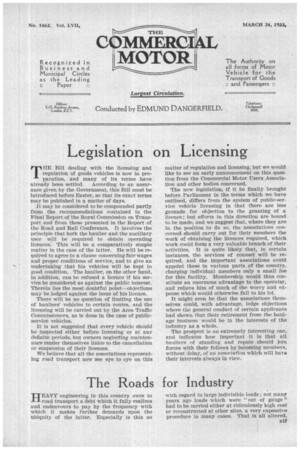Legislation on Licensing
Page 27

If you've noticed an error in this article please click here to report it so we can fix it.
THE Bill dealing with the licensing and regulation of goods vehicles is now in preparation, and many of its terms have already been settled. According to an assurance given by the Government, this Bill must be introduced before Easter, so that its exact terms may be published in a matter of days.
It may be considered to be compounded partly from the recommendations contained in the Final Report of the Royal Commission on Transport and from those presented in the Report of the Road and Rail Conference. It involves the principle that both the haulier and the ancillary user will be required to obtain operating licences. This will be a comparatively simple matter in the case of the latter. He will be required to agree to a clause concerning fair wages and proper conditions of service, and to give an °undertaking that his vehicles will be kept in good condition. The haulier, on the other hand, in addition, can be refused a licence if his service be considered as against the public interest. Therein lies the most doubtful point—objections may be lodged against the issue of his licence. There will be no question of limiting the use of hauliers' vehicles to certain routes, and the licensing will be carried out by the Area Traffic Commissioners, as is done in the case of publicservice vehicles.
It Is not suggested that every vehicle should be inspected either beforelicensing or at any definite periods, but owners neglecting maintenance render themselves liable to the cancellation or suspension of their licences.
We -believe that all the associations representing road transport now see eye to eye on this matter of regulation and licensing, but we would like to see an early announcement on this question from the Commercial Motor Users _Association and other bodies concerned.
The new legislation, if it be finally brought before Parliament in the terms which we have outlined, differs from the system of public-service vehicle licensing in that there are less grounds for objection to the granting of a licence ; but efforts in this direction are bound to be made, and we suggest that, where they are in the position to do so, the associations concerned should carry out for their members the work of obtaining the licences required, which work could form a very valuable branch of their activities. It is quite likely that, in certain instances, the services of counsel will be required, and the important associations could appoint these in various parts of the country, charging individual members only a small fee for this facility. Membership would thus constitute an enormous advantage to the operator, and relieve him of much of the worry and expense which would otherwise fall to his lot.
It might even be that the associations themselves could, with advantage, lodge objections where the general conduct of certain applicants had shown that their retirement from the haulage business would be in the interests of the industry as a whole.
The prospect is an extremely interesting one and indicates how important it is that all linuliers of standing and repute should join forces with their fellows by becoming members, without delay, of an association which will have their interests always in view.




























































































